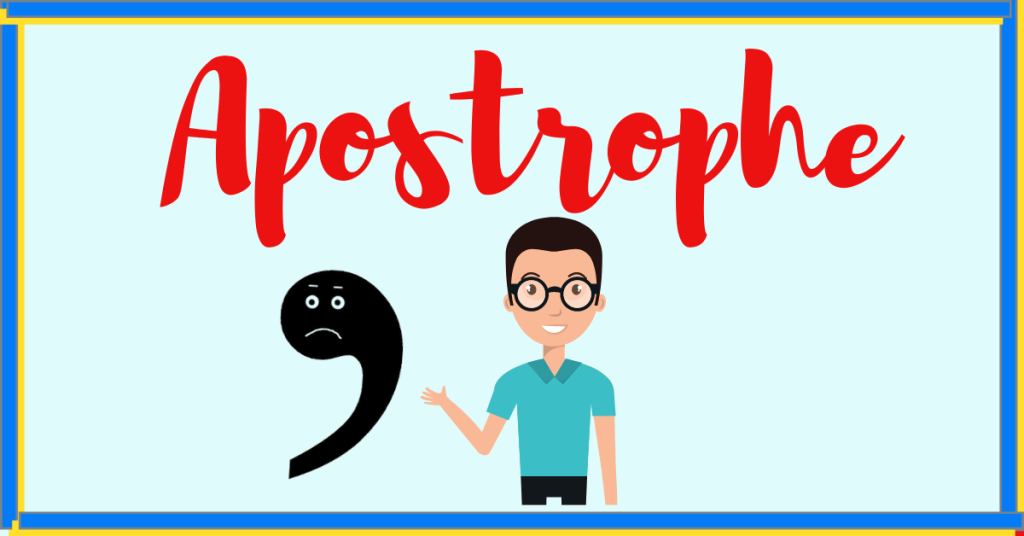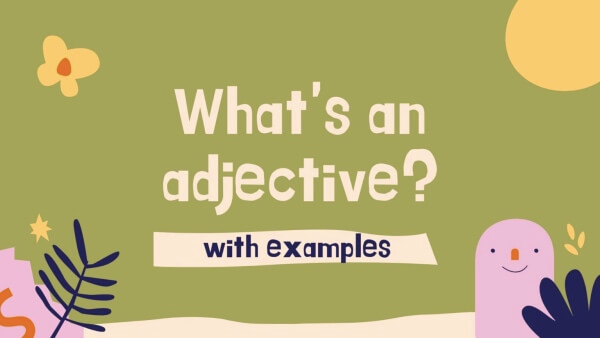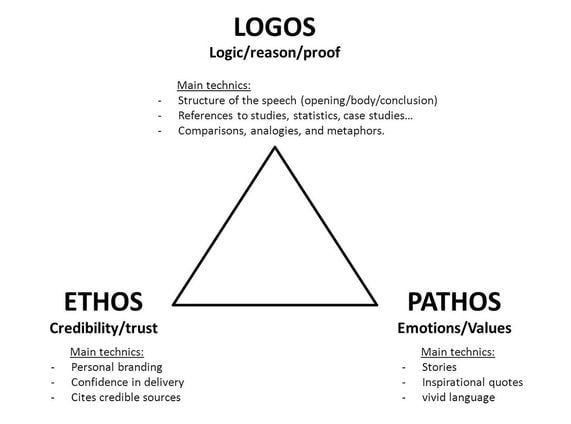- Declarative Sentences
- The Word Order in a Declarative Sentence
- A Video Summary
- Imperative Sentences
- Types of Imperative Sentence
- A Video Summary
- Interrogative Sentence
- A Video Summary
- Why Should I Care about Interrogative Sentences?
- Key Points
- Exclamatory Sentences
- Easy Examples of Exclamatory Sentences
- A Video Summary
- Why Should I Care about Exclamatory Sentences?
- SOME QUICK FAQs FOR YOU
- Q1 What are the 4 types of Sentences?
- Q.2 What are the three main sentences types?
- Q.3 How do you teach the four types of sentences?
- Q.4 What are the 5 kinds of sentences?
- Q.5 What are the 6 types of sentences?
- Q.6 What are the 10 types of sentences?
- Q.7 What are the examples of sentences?
- Q.8 What are the 12 sentences?
- Q.9 What are the three forms of sentences?
- Parting Words From Podium
We employ a variety of sentences to describe or communicate what we want to say.We’ll look at four different types of sentences: declarative, interrogative, imperative, and exclamatory, each with its own purpose and patterns.
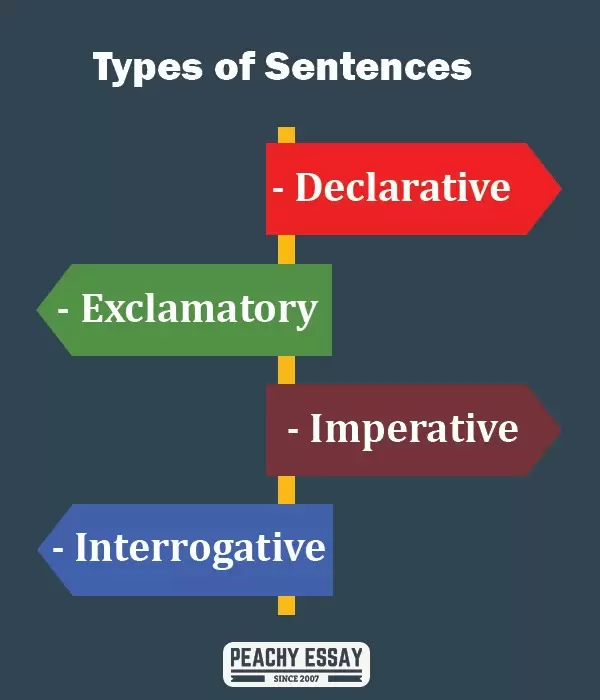
Declarative Sentences
Amongst the various types of sentences, first is the Declarative Sentence. Declarative Sentences are sentences that make a statement. They are used to express facts and thoughts, or to declare something. In both writing and speaking, this is by far the most common type of statement.
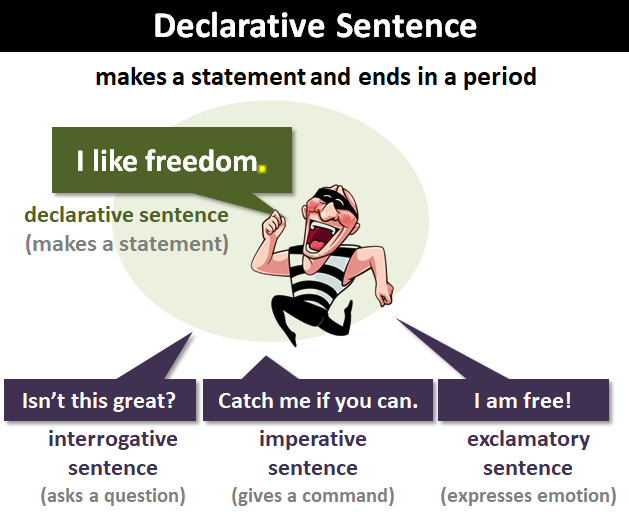
Consider how you communicate in your daily life. The majority of human communication consists of giving and receiving information. We talk to individuals about what we want to know, we answer their questions, and we share our own ideas and viewpoints. Declarative sentences express this type of message.
Listed below are a few examples:
- The cat went to the park.
- Ram saw the cat playing with a ball.
- Cats do not run away .
- The cats which run away are not properly trained.
The Word Order in a Declarative Sentence
In a basic declarative phrase, the conventional word sequence is subject–verb–object–place–time.
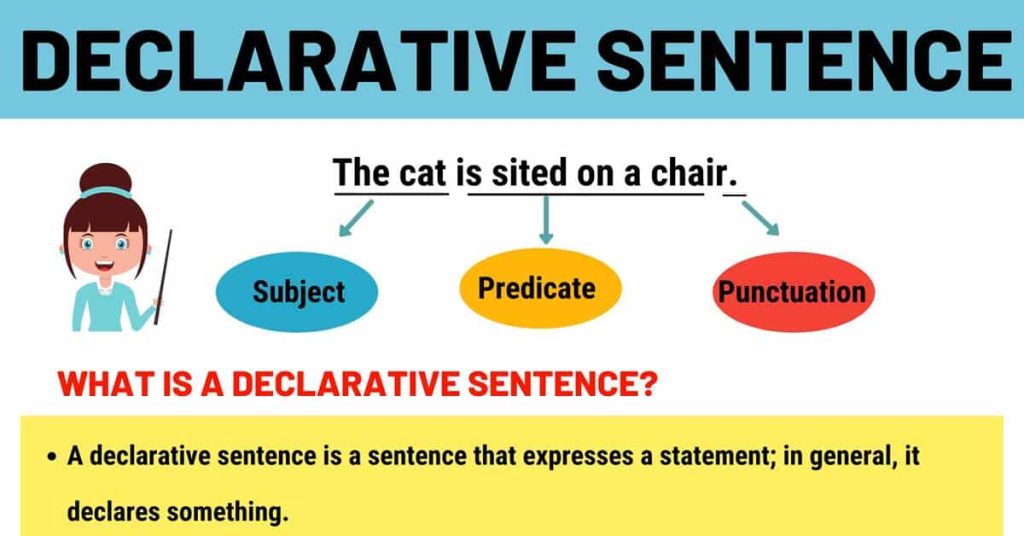
For example:
- The cows eat the vegetables in the garden in the early morning.
This is not intended to be construed as a rule. It would be monotonous if all writing comprised of fundamental phrases with the same word arrangement.
Here is an example of a complex sentences:
- Just before the sun rises, the cows eat the vegetables in the garden.
The word order is frequently altered to verb-subject in an interrogative statement (i.e., a question). An interrogative comment has another distinguishing feature.
Consider the following two examples:
- Riya is Indian.
- Is Riya Indian?
consider the following example :
- Riya asked whether I liked her dress.
A Video Summary
Declarative statements is summarised in this video.
Why Should I Care about Declarative Sentences?

The most prevalent sentence structure is declarative sentences.As a result, understanding how they’re organised is critical if you’re learning or teaching English.
Declarative statements pose two common writing obstacles for native English speakers.
When writing a declarative sentence, avoid using a question mark.
Using a question mark at the end of a statement that isn’t a question is the most common mistake made with declarative sentences.
- The employer has asked when the function starts?

- I wonder if I can cook?

- Mohan wants to know whether he was tested positive?

Look at the word order:
- “The employer has asked…” (subject-verb)
- “I wonder…” (subject-verb)
- “Mohan wants…” (subject-verb)
These are plainly declarative statements, not questions (i.e., interrogative sentences).
Even in the indirect-question parts of the phrases, the word order remains subject-verb:
- “the function starts” (subject-verb)
- “I can cook” (subject-verb)
- “he was tested positive” (subject-verb)
In an indirect inquiry, make sure the word order is correct.
This point is related to Issue 1. In an indirect question, the word order is the same as in a declarative phrase.
For example:
Question Word Order:
- Where is she?
Statement Word Order:
- She is here.
Indirect Question Word Order:
- I want to know where she is.

- I want to know where is she.

Key Points
- A question mark is not required for an indirect question.Only a direct question does.
- The word order of an indirect question is the same word order as a declarative sentence (subject-verb) not a question (verb-subject).
Imperative Sentences
This form of remark is used to make a plea or issue an order. Imperative sentences usually end with a full stop, although in some situations, they can also end with an exclamation mark .
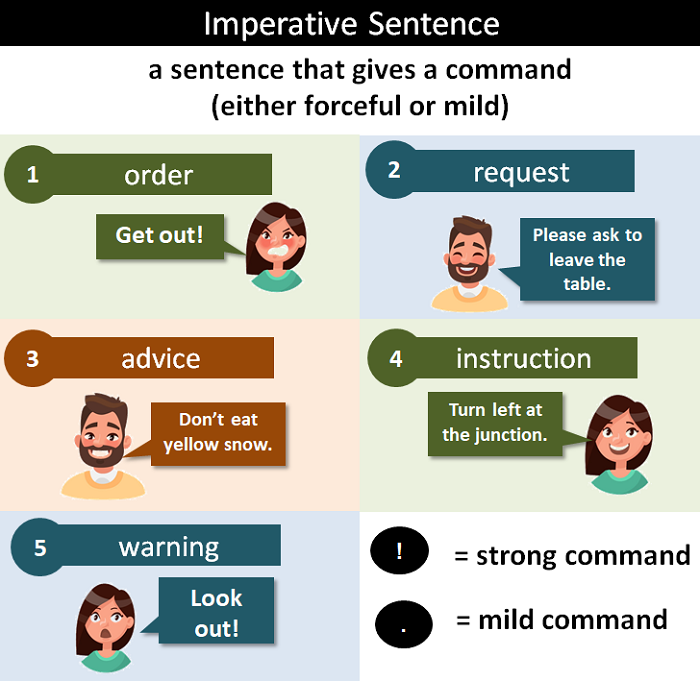
Types of Imperative Sentence
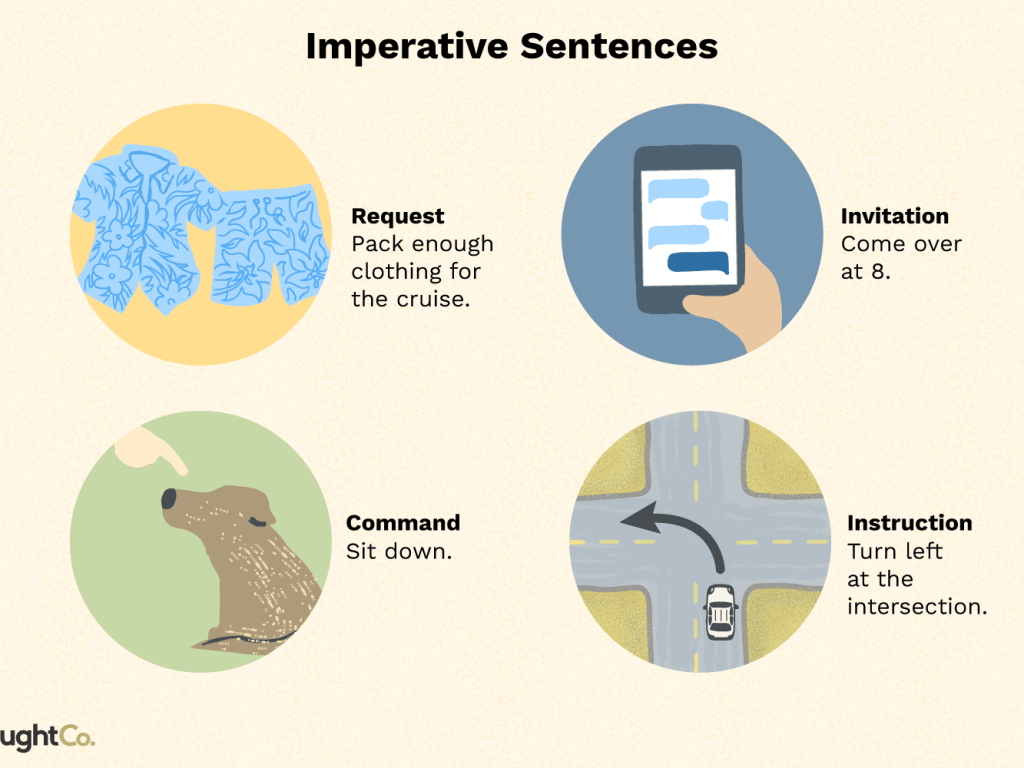
- Share a Wish or Request
This type of imperative sentence is used to express a wish or a respectful request to another person. fPlease pardon me
- An Invitation
This form of imperative sentence is used to invite someone to a dinner party, for example: “Please join me for dinner.”
- Share a Command/Request
Stop messing around and assist me!” These imperative sentences convey an order or request, such as “Stop messing around and help me!”
- Give Instructions
The command is given in this form of urgent sentence. for example, Take a right and continue straight.
Here are a few Examples-
- Never trouble a person who teaches you.
- Take a left and go straight.
- Don’t be so scared of his temper.
- Don’t rush or you will forget your papers.
- Practice more to read well.
- Read whenever you get a chance.
Best places to use Examples of Imperative Sentences
Forceful commands end with an exclamation mark.
- Get out!
- Watch your mouth, young man!
- Go, and never darken my towels again!
Following a polite or delicate order, a period is used (full stop).
- Pass the book.
- Don’t forget to give the book.
- If you’ve heard this news before, don’t stop me, because I’d like to hear it again.
- A child of six would understand this. Send someone to fetch a child of six.
- I came first, Meena!
- Shut up! The context, not the exclamation mark, will tell you if the speaker is hostile or surprised.
More about Imperative Sentences
In an imperative sentence, the main verb is said to be in the imperative mood. In grammar, the mood of a verb indicates how it should be regarded (for example, as a fact, an order, a wish, or a doubt).
The three moods in English are imperative, indicative, and subjunctive.
Forming Imperative Sentences
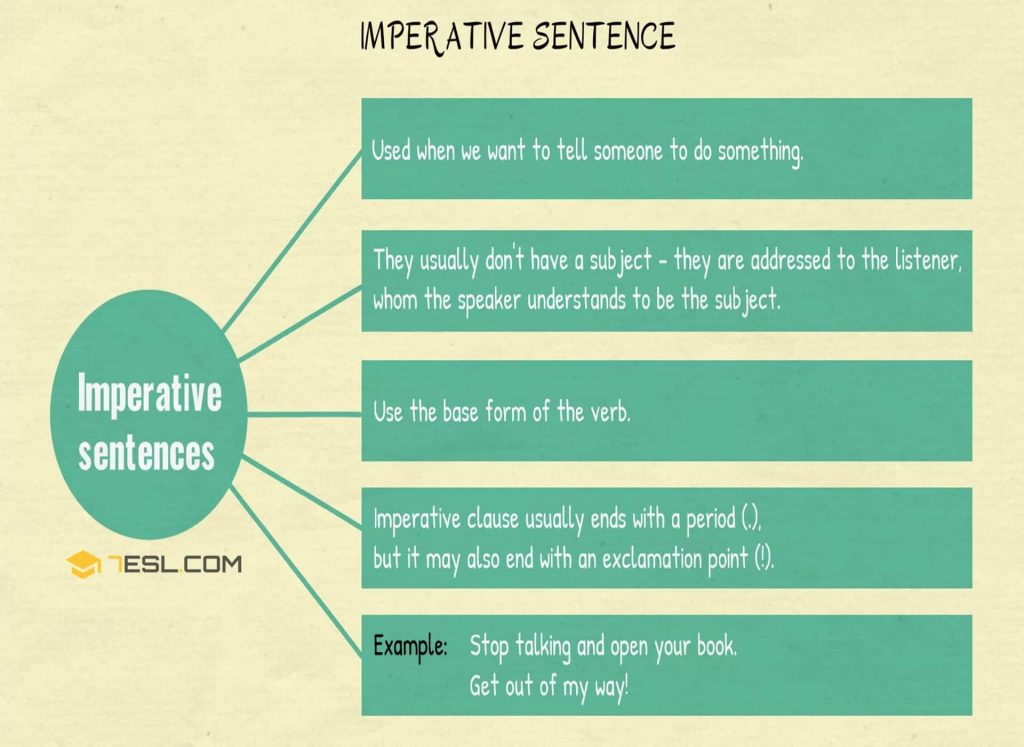
In English, an imperative statement uses the verb’s bare infinitive form (i.e., the version without “to”).
Example 1:
- Infinitive form: to eat.
- Bare infinitive form: to eat.
- Imperative verb: eat in the park.
Example 2:
- Infinitive form: to be
- Bare infinitive form: to be
- Imperative verb: Be the best version of yourself.
Example 3:
- Infinitive form: to do
- Bare infinitive form: to do
- Imperative verb: If you’ve heard this story before, do not stop me, because I’d like to hear it again.
It’s worth noting that an imperative verb lacks a subject. “You” is the topic, although it is inferred. It’s never been utilised.
- On the whistle, you jump in the river..
- For the rest of the life, you be the best version of yourself.
A Video Summary
This lesson on imperative sentences is summarised in this video.
Interrogative Sentence
This type of statement is in the form of a question. An interrogative statement must end with a question mark and an inquiry.
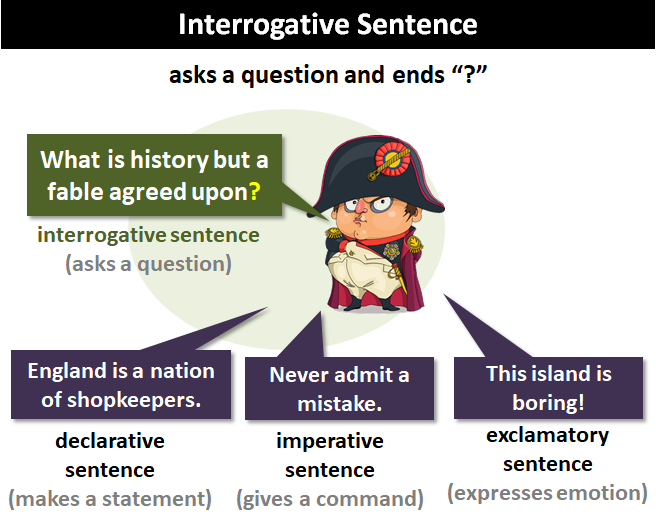
When someone wants to know something and asks a question, these sentences are commonly employed. Three different types of queries are included in the interrogative statement.
- es/No question: the answer to this kind of question is “yes or no”, for example:
Do you want Breakfast? (No, thank you.)
- Question with a word: the response to this type of question is some “information.” for example:
Where do eat? (In Park.)
- The answer to a choice question is “in the question,” which means “in the question.” for example:
Do you want tea or coffee? (Tea please.)
Examples-
- Is she catholic?
- Where do you study?
- What do you want to have for breakfast?
- Do you like the sweets?
Best places to use Examples of Interrogative Sentences
- Is it possible to succeed without any failure?
- Why do I eat everything when I’m on diet?
- Do you want to feel happy or to do good?
Types of Questions
The following are the three primary sorts of questions:
- Yes/No Questions.
Example: Is it raining? - “Question Word” Questions.
Example: Why are you sad? - Choice Questions.
Example: Do you want pasta or cheese burger?
A Video Summary
Here is a video summarizing this lesson on interrogative sentences.
Forming the Three Question Types
Forming Yes/No Questions
Yes/no questions are formed:
Auxiliary verb + Subject+ Main Verb + Remainder
Some examples of yes/no questions:
| Auxiliary Verb | Subject | Main Verb | Remainder | Possible Answer |
|---|---|---|---|---|
| Can | elephants | swim? | Yes, they can. | |
| Has | the turtule | returned | to the water? | No, it hasn’t. |
With the verb “to be” in the present tense or the past tense, the format is as follows:
| Verb To Be | Subject | Remainder | Possible Answer |
|---|---|---|---|
| Are | you | jealous? | Yes, I am. |
| Was | she | dancing? | No, she wasn’t. |
Forming “Question Word” Questions
“Question word” questions are formed:
Question word+ Auxiliary word + Subject + Main Verb + Remainder
Here are some “question word” questions to consider:
| Question Word | Auxiliary Verb | Subject | Main Verb | Remainder | Possible Answer |
|---|---|---|---|---|---|
| Where | did | the bus | stop? | Boston. | |
| Why | was | the police | waving | the flag? | To stop the vehicle. |
The format is as follows when the inquiry word is “who”:
| Question Word (and Subject) | Main Verb | Remainder | Possible Answer |
|---|---|---|---|
| Who | knows | when the bus arrives? | He does. |
| Who | has been washing | these cups? | Priya |
The format is as follows when employing the verb “to be” in the present or past tense:
| Question Word | Verb To Be | Subject | Remainder | Possible Answer |
|---|---|---|---|---|
| When | is | good Friday? | coming week . | |
| Why | are | you | cleaning? | No reason. |
Forming Choice Questions
The following are examples of multiple-choice questions:
Auxiliary Verb + Subject + Main Verb + Choice 1 + “or” + Choice 2
Some examples of choice questions:
| Auxiliary Verb | Subject | Main Verb | Choice 1 | or | Choice 2 | Possible Answer |
|---|---|---|---|---|---|---|
| Does | she | want | the green one | or | the black one? | The black one. |
| Did | priya | catch | a whelk | or | a bass? | A whelk. |
When using the verb “to be” in the present or past tense, the format is as follows:
| Verb To Be | Subject | Choice 1 | or | Choice 2 | Possible Answer |
|---|---|---|---|---|---|
| Is | this | right | or | wrong? | It’s right. |
| Were | you | angry | or | mad? | mad. |
Why Should I Care about Interrogative Sentences?
The use of interrogative sentences is crucial. They’re the means by which we can obtain the information we require. Interrogative sentences are the second most prevalent sentence form after declarative sentences (sentences that make statements).
It’s crucial to grasp how they’re produced if you’re learning or teaching English. Interrogative sentences are unlikely to be the source of any severe writing faults if you’re a native English speaker. Nonetheless, there are two compelling reasons to consider interrogative statements more carefully.
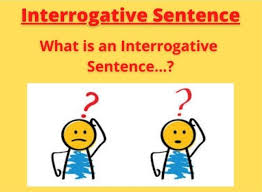
(Reason 1) Don’t use a question mark after a non-question.
Among native English speakers who understand how to compose the three sorts of questions, interrogative sentences (i.e., questions) are not the source of major errors. When writers mistake a non-question for a question and insert a question mark, the most prevalent error with interrogative phrases occurs.
- I want to know if it’s done?

- I wonder if I’ll ever find my shoes?

When a statement involves an indirect inquiry, this error is most likely to occur. A direct question contained within a statement or another inquiry is known as an indirect question. “Is it finished?” and “Will I ever find my shoes?” are the imbedded direct queries.
(Reason 2) To bring up a topic, use a rhetorical inquiry.
Rhetorical questions (i.e., questions that aren’t meant to elicit a response) might be used to convey a point or introduce a topic.
- When are you ever settled enough to have kids? (Actor Benedict Cumberbatch)
- Is the Loch Ness monster dead?
Key Points
- After a statement that incorporates an indirect question, don’t use a question mark..
- I wonder if that’s right?

- I need to know whether I’m elected?

- I wonder if that’s right?
- A question might be an intriguing method to make a point.
- What’s not to say?
- A question can be an engaging method to introduce a concept.
Exclamatory Sentences
An exclamatory phrase is one in which you make a statement that expresses any emotion and ends with an exclamation mark. These are frequently used in the English language and are beneficial to have in your vocabulary as a means of self-expression.
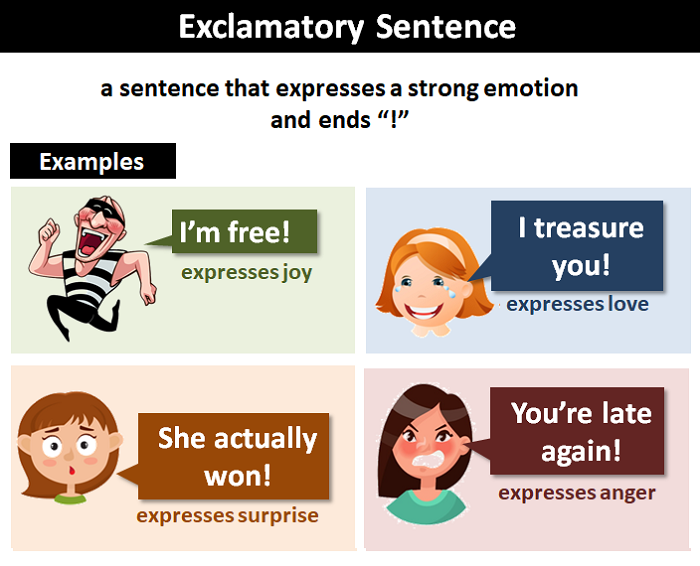
Exclamatory sentences are uncommon in academic writing, unless they exist in quoted material, which is unlikely in that field. Please be aware that using too many exclamation marks and exclamation points in essays, presentations, nonfiction, or fiction can make you appear unprofessional. Exclamations should only be used when absolutely required, such as in a direct quote or discussion.
Examples-
- Jesus! He scared the hell out of me!
- You were supposed to be there yesterday!
- Hurray! We won the cricket match.
- It’s a boy!
Take into account the following:
Take note of the structure and function of each of the four sentence forms outlined above.
We normally use a declarative sentence to make a statement.
To ask a question, we employ the interrogative form of the sentence.
The imperative form is used to offer a command, whereas the exclamative form is used to express an exclamation.
Function and form, on the other hand, may not always be in sync, especially when intonation fluctuates. For example, we can issue a command using the declarative form: “You will now begin writing.” In a sentence, the interrogative form can also be employed to make an exclamation—Wow, can Yash play the violin!
“Is he in the team?” we can also ask using the declarative form. As a result, rather of seeking for obvious indications, it’s crucial to comprehend the tone of the text.
Easy Examples of Exclamatory Sentences
Here are some examples of exclamatory sentences:
- You were meant to be here yesterday!
- Jeepers! You scared the life out of me!
- We loose!
- This game is driving me up the wall!
- You’re admirable!
- It’s a girl!
- I’m really not going to see this place!
Exclamatory Sentences Starting with “What” and “How”
“What” and “how” can be used to form exclamatory sentences.
- What a ball that was!
- How crazy he is!
Little Red Riding Hood provides the most frequently mentioned examples:
- What big ears you have!
- How sharp your vision, grandma!
It’s worth noting that the word order in all four examples is still subject-verb (“that was,” “she is,” “you have,” “your teeth are”). Each sentence’s initial component (i.e., the part starting with “what” or “how” seems out of place).
This is done on purpose. The purposeful alteration of normal word order for emphasis is known as anastrophe.Of course, the words “what” and “how” are most commonly used to ask questions .
Consider the following scenario:
- What is the dog doing?
- How are you?
Best places to use Examples of Exclamatory Sentences
- You clean the bed, you do the kitchen work and nine months months later you have to start all over again. I hate housework!
- It’s dead! It’s dead!
An exclamatory sentence is often preceded by an interjection (shown in bold):
- Jeepers, you’re actually up before lunch!
- Wow! That’s amazing!
- Oh! Most miserable wretch that I am! Why have I not learnt how to drive?
Keep in mind that not every statement that ends with an exclamation mark is a good one.
- Shut the front door!
- Where’s the dog!
A Video Summary
Here in this video Exclamatory sentences are explained.
Why Should I Care about Exclamatory Sentences?
Exclamatory phrases should be used sparingly. A surge of emotion comes from an exclamatory statement. If you put emotion into everything, you’ll end up with nothing but emotion.
An exclamatory statement can be effective for highlighting a point, but only if the emphasis is delivered through the expression of emotion. To emphasise the importance of a declarative sentence (a matter-of-fact statement), don’t use an exclamation point at the conclusion of it. If you make a habit of utilising exclamation marks instead of words to convey the importance of a remark, your readers will rapidly begin to doubt your writing skills and even your sincerity.
Also, in a sentence, don’t use more than one exclamation mark.
- Five exclamation marks, the sure sign of an insane mind.
- I can’t believe it’s not butter!
Exclamatory sentences are uncommon in professional correspondence and advertising, although they are widespread in informal correspondence.
Key Points
- Exclamatory sentences should be used rarely, and you should never use more than one exclamation mark.
SOME QUICK FAQs FOR YOU
Q1 What are the 4 types of Sentences?
Types of Sentences with Examples
Here, we will talk about four different types of sentences:
jdeclarative, interrogative, imperative, and exclamatory; each has its functions and patterns.
Q.2 What are the three main sentences types?
There are three main types of sentence structure – simple , compound and complex .
Q.3 How do you teach the four types of sentences?
Q.4 What are the 5 kinds of sentences?
if we talked about the meaning-based division of sentences, there are 5 kinds of sentences.
- Declarative Sentence.
- Interrogative Sentence.
- Imperative Sentence.
- Exclamatory Sentence.
- Optative Sentence.
Q.5 What are the 6 types of sentences?
Some of them listed are: 1- Imperative, 2-Negative, 3-Interrogative, 4-Interrogative negative, 5-Exclamatory, 6– Declarative (Direct statement, In-direct statement).
Q.6 What are the 10 types of sentences?
10 Sentence Structure Types You Should Recognize With Examples
- Simple Sentence Structure: Ernest Wolfe. …
- Periodic/Interruptive Sentence Structure: Definition: …
- Cumulative/Loose Sentence Structure: …
- Inverted Sentence Structure: …
- Parallel/Balanced Sentence Structure: …
- Tricolon/Triadic Sentence: …
- Anaphora: …
- Rhetorical Question:
Q.7 What are the examples of sentences?
Examples of simple sentences include the following:
- Joe waited for the train. “Joe” = subject, “waited” = verb.
- The train was late. …
- Mary and Samantha took the bus. …
- I looked for Mary and Samantha at the bus station. …
- Mary and Samantha arrived at the bus station early but waited until noon for the bus.
Q.8 What are the 12 sentences?
Before we begin, here’s a list of the 12 verb tenses in English:
- Present Simple
- Past Simple
- Future Simple
- Present Continuous/Progressive
- Past Continuous/Progressive
- Future Continuous/Progressive
- Present Perfect
- Past Perfect
- Future Perfect
- Present Perfect Continuous/Progressive
- Past Perfect Continuous/Progressive
- Future Perfect Continuous/Progressive
Q.9 What are the three forms of sentences?
Three essential types of sentence are declarative sentences (which are statements), interrogative sentences (which are questions), and imperative sentences (which are orders). Join us as we give examples of each!
Parting Words From Podium
After exploring such intriguing concepts and tricks related to types of sentences, who wouldn’t want to jump on newer concepts? so, what’s the wait for? Check out the Podium Blog for more.
Share with your friends




